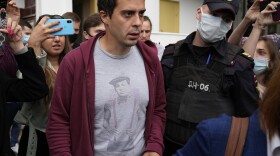RACHEL MARTIN, HOST:
Moscow lawyer Alexei Navalny has become one of President Vladimir Putin's loudest critics. Navalny is calling for nationwide protests against government corruption and is planning to run for president himself next year. But he's been banned from national television, so Navalny has taken to YouTube to get his message out. And now, the Kremlin is scrambling to respond. Here's NPR's Lucian Kim from Moscow.
(SOUNDBITE OF VIDEO, "NAVALNY LIVE")
LUCIAN KIM, BYLINE: That's the sound of Alexei Navalny's weekly news show on his YouTube channel, "Navalny Live," which first went online in March.
(SOUNDBITE OF VIDEO, "NAVALNY LIVE")
ALEXEI NAVALNY: (Speaking Russian).
KIM: For the next hour, he'll comment on the main events of the week, take questions from his Twitter feed and call on his followers to take to the streets in anti-government protests. Oksana Baulina, who runs "Navalny Live," says it's designed to be the exact opposite of the slick scripted productions Russians see on state TV.
OKSANA BAULINA: The idea of "Navalny Live" was about livestreams, interaction with our audience. Russian TV channels in general a long time ago dropped the practice of live programs.
KIM: Navalny owes his career as an anti-corruption campaigner to the Internet, first with a blog, then collecting almost 2 million followers on Twitter and now with his online videos.
(SOUNDBITE OF VIDEO, "NAVALNY LIVE")
KIM: One of those videos claim Prime Minister Dmitry Medvedev is personally benefiting from a network of luxury properties. Navalny's investigation had more than 21 million YouTube views and brought thousands of people onto the streets in nationwide protests in March. Yevgenia Albats, editor of Moscow's The New Times magazine, says Navalny is exploiting President Vladimir Putin's distrust of the Internet.
YEVGENIA ALBATS: Putin doesn't trust Internet. He believes that it is a trash can, that no real information exists, that he himself doesn't use it. And therefore, his bureaucracy in general is not using it as well.
KIM: By contrast, Albats says, Navalny understands the importance of reaching out to young people in a language and medium they can understand. That's not to say pro-Putin forces aren't trying to hit back.
(SOUNDBITE OF SONG, "BABY BOY")
ALISA VOX: (Singing in Russian).
KIM: In mid-May, a video appeared on YouTube by pop singer Alisa Vox advising schoolboys to do their homework instead of going to political rallies. She joined rapper Ptaha, who insinuated that the protesters were taking money from Uncle Sam.
(SOUNDBITE OF MUSIC)
PTAHA: (Rapping in Russian).
KIM: Both videos got millions of hits, but this being the Internet, they were also pilloried by viewers. Later, the comments sections of both songs were taken down.
(SOUNDBITE OF ARCHIVED RECORDING)
NAVALNY: (Speaking Russian).
KIM: "The Kremlin is actively intervening on YouTube," Navalny said, "but I don't think they'll have it very easy there. Most recently, one of Russia's richest men, Alisher Usmanov, waded into the fight. He started his own YouTube channel to rebuff Navalny's charges that he was involved in corruption. Navalny, a veteran of online struggles, is taking on all challengers with gusto. At the end of his show last Thursday, Navalny urged his viewers not to despair.
(SOUNDBITE OF VIDEO, "NAVALNY LIVE")
NAVALNY: (Speaking Russian).
KIM: There's a huge number of people who are unhappy about corruption and who don't want Putin to be re-elected for another 12 years," Navalny said. "You're not alone, you just have to find like-minded people in your town." Lucian Kim, NPR News, Moscow. Transcript provided by NPR, Copyright NPR.





